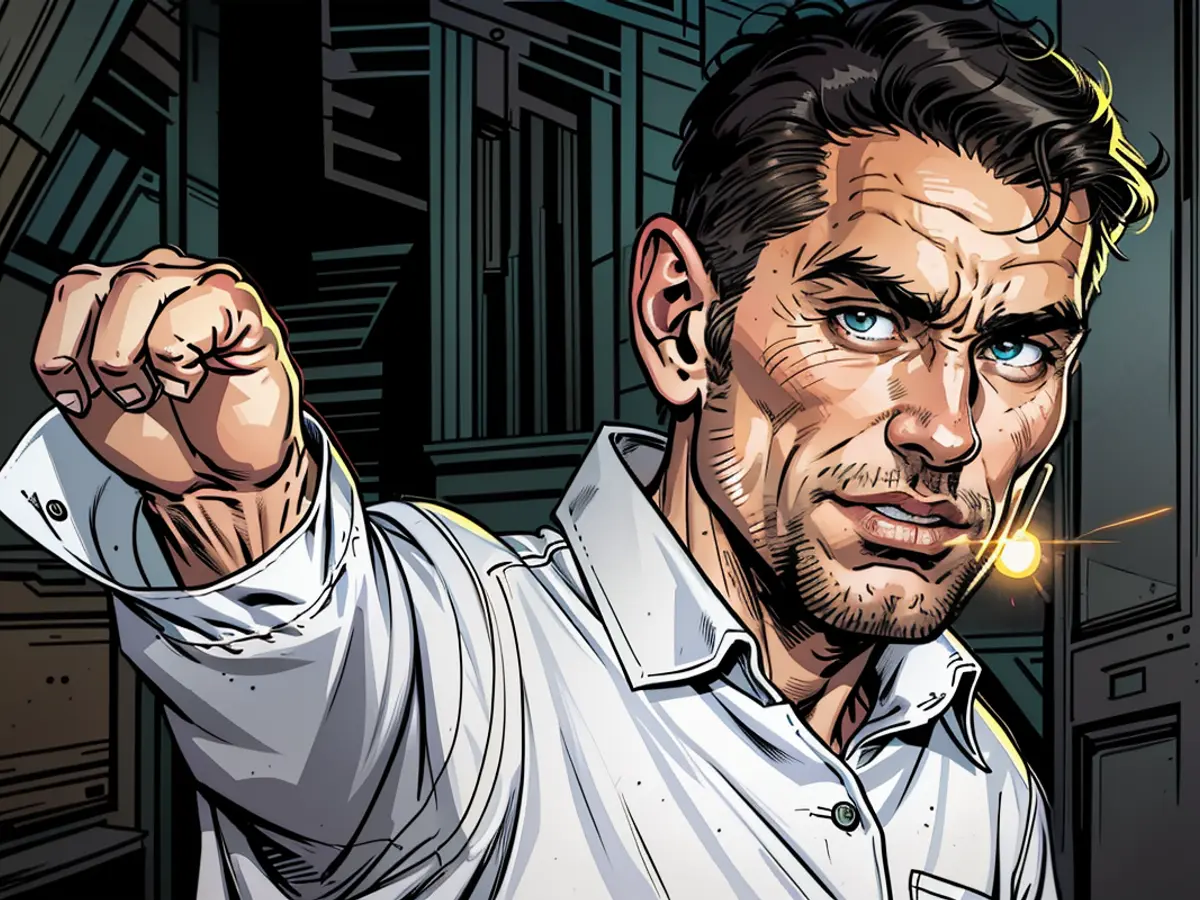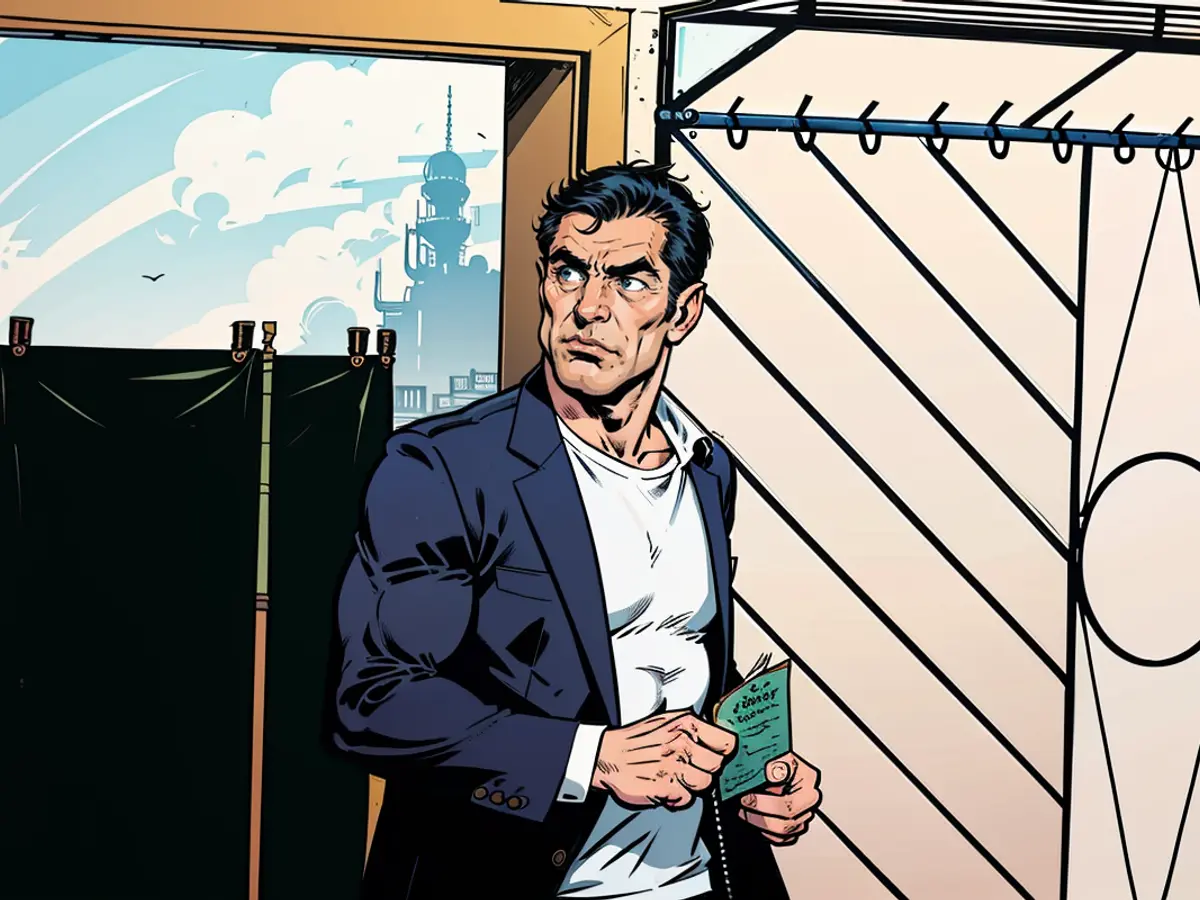19:50: The Policy of Barring the AfD's Success has Crumbled
In Thuringia, the AfD emerges as the dominant force in the state parliament. Lead candidate Björn Höcke asserts that the "firewall policy has failed." During an interview with ntv, he describes the election result as a "historic achievement" and discusses the upcoming government formation.
19:42 Ramelow: The Left Party Experiences a "Devouring"
Thuringian Minister President Bodo Ramelow identifies two reasons for the "devouring" of his Left Party. First, the constant equating of the AfD and the Left by the CDU, as well as the CDU's recurrent "exclusionist" statements directed at him, despite having shared power with them for five years. Second, the BSW, who had stated they would garner 17% of the votes for the AfD, is now acknowledged for taking votes away from the Left. Ramelow nevertheless celebrated the high voter turnout.
19:26 Nouripour Regards the Success of the AfD as a "Turning Point"
The AfD garners more than 30% in the state elections in Saxony and Thuringia, putting the traffic light parties well behind. Green Party leader Omid Nouripour views the AfD's election result as a "turning point" and a mandate for defending democracy collectively.
19:13 Latest Projection for Saxony: The CDU Wins Closer

The latest ZDF projection shows the CDU edging closer to the AfD in Saxony: The Christian Democrats now have a slim lead with 31.7%, just slightly ahead of the AfD with 31.4% of the votes cast. The BSW earns 11.4%, while the SPD collects 7.8%. The Greens would find safety in the state parliament with 5.5%, whereas the Left falls short of the five percent hurdle with 4.3%.
19:08 Wagenknecht Wants to Form a Coalition with CDU and Potentially SPD in Thuringia
BSW leader Sahra Wagenknecht aims to form a coalition with the CDU and potentially the SPD in Thuringia. "We are hopeful that we will be able to establish a good government together with the CDU at the end - possibly also with the SPD," said Wagenknecht in ARD. Post five years of minority government, people yearned for a stable majority government that would tackle pressing issues such as "severe teaching shortages" in Thuringia. Concurrently, citizens desired a state government that would voice its concerns at a national level - one that would champion peace, diplomacy, and opposition to the deployment of US missiles in Germany. Wagenknecht ruled out coalitions with the AfD for Thuringia.
18:56 Goring-Eckardt: The Success of the AfD is a "Shock" in GermanyHigh-ranking Green Party politicians in Germany are shaken by the AfD's success in Thuringia, feeling a far more severe impact than their defeat in the state elections. Green Bundestag Vice President Katrin Goring-Eckardt sees the success of the far-right extremists as a "shock" for Germany. Party leader Omid Nouripour concedes that his feelings of failure are "marginal" compared to the triumph of the AfD, as they had taken the position as the strongest force in a state parliament.
18:48 Kretschmer on Saxony: "We Have Every Reason to Celebrate"The current Saxon Minister President Michael Kretschmer views the CDU as a steadfast anchor in the government coalition. "We have every reason to celebrate," said Kretschmer at his election party. "Hindsight reveals five challenging years," the people of Saxony have placed their trust in the CDU rather than a "protest vote." The minister president acknowledged the dissatisfaction citizens felt toward the situation in Berlin.

18:39 Preliminary Result for Saxony: The CDU's Lead Over AfD NarrowsAccording to initial projections on ZDF, the CDU's lead over the AfD in the Saxony state election has narrowed: The CDU now holds a slim edge with 31.9%, barely ahead of the AfD with 31.3% of the votes cast. The BSW earns 11.6%, while the SPD collects 7.8%. The Greens would just manage entry into the state parliament with 5.2%, whereas the Left would miss the mark with 4.5%.
18:33 AfD Chairman Weidel Leads Government Participation Claims for AfDAfD federal party chairman Alice Weidel advocates for her party's participation in government in Thuringia and Saxony. "In accordance with normal practices in this country, the strongest party, which is the AfD, initiates discussions," says Weidel in ARD, referring to Thuringia. "The voters want the AfD to have some influence in the government. We garner 30% of the votes in both federal states, without which a stable government becomes an impossibility."
18:30 SPD Chief: Scraped Bottom in State Parliaments SPD Secretary General Kevin Kuhnert admitted his party's subpar performance in the Thuringia and Saxony elections. "This isn't a night to rejoice for the SPD," he stated on ARD. Over the years, his party has been struggling. "There was a genuine risk of being ousted from the state parliaments," Kuhnert revealed. "We're in for a fight, and our presence is essential." Changes are needed, Kuhnert argued, pointing out the need for clearer communication and listening to voters. Regarding Chancellor Olaf Scholz, he said, "We need to collaborate to clarify our politics."
18:23 Höcke Cheers Victory in Thuringia as "Great Triumph"AfD faction leader Björn Höcke views the Thuringia result as a monumental achievement. The AfD ranks as the top popular party in the federal state, with Höcke declaring on MDR, "The absurd 'firewall' myth needs to end."
18:21 Chrupalla on Thuringia: AfD Races Neck and Neck with CDUAfD party leader Tino Chrupalla celebrates his party's remarkable results, attributing the shift in politics in both federal states to voter sentiments. Speaking to ZDF, he noted that the AfD is open to dialogues with all parties. In Saxony, he maintains, the AfD is neck and neck with the CDU. He emphasizes that the AfD aims to govern for Saxony's benefit.

18:17 CDU Chief Rules Out Coalition with AfDCDU Secretary-General Carsten Linnemann has categorically denied any coalition with the AfD in Thuringia or Saxony. "We're resolute on this," he declared on ARD. The CDU will lead coalitions from the center of parliament, he assured, trusting that it will be successful. The CDU, he insists, continues to be the last populous party and the primary bulwark. While the 'traffic light' parties have been penalized, he says.
18:13 Initial Projection for Saxony: CDU Edges Out AfD, BSW at 12%, Greens Barely inThe first projection for the Saxony state election reveals the CDU triumphing with a 31.5% vote share, narrowly surpassing the AfD's 30%. The BSW emerges as the third strongest force, attaining 12%, while the SPD finds its way into the state parliament with a 8.5% share. The Greens teeter on the brink, securing 5.5% of votes. Both the Left and the FDP miss the cut for the new parliament.
18:10 Initial Projection for Thuringia: AfD Leads CDU, BSW Enters Parliment at 16%The first projection for the Thuringia state election indicates the AfD commanding an expected majority, storming in at 30.5%, outpacing the CDU at 24.5%. The Left takes a 12.5% share, with the SPD following at 7%. The BSW establishes itself as a new presence in the state parliament, notching up a 16% share. At the brink of the 5% threshold, the Greens and the FDP continue to lag behind.
18:01 AfD Ranked Top in Thuringia, BSW Breaks Double Digits in SaxonyA preliminary report after the Thuringia state election reflects the AfD as the most influential party, as expected. The SPD ascends over the 5% hurdle, while the Greens and the FDP fail to meet the mark. In Saxony, the BSW registers a double-digit score. The CDU holds a narrow advantage over the AfD. The Left and the FDP would not secure representation, while the Greens maintain their presence.
17:18 Höcke at Risk of Failing to Enter Thuringia ParliamentAFD faction leader Björn Höcke in Thuringia faces uncertainty over securing a seat in the future state parliament. His fellow successful candidates may challenge him. Several AFD constituency candidates appear poised for a direct mandate triumph. Höcke, however, grapples with stubborn competition from CDU candidate Christian Tischner in his constituency of Greiz II. If Tischner triumphs and the AfD surpasses its entitlement to direct mandates from second votes, nobody can secure a seat from the state list, not even from the first position, which Höcke occupies. In this situation, the AfD might appeal to a successful direct candidate to relinquish their seat, enabling Höcke to secure his.

16:48 Media Barred from Thuringia AF D's Election CelebrationThere's a strong likelihood that the Thuringia AF D's election jamboree won't be covered by traditional media. The party, labeled right-wing radical by the constitutional protection agency, attempted to restrict several media outlets from attending the event. However, a court preventive measure blocked this, prompting the state party to bar all press, citing organizational difficulties, alleging there wasn't sufficient space at the venue for all media representatives who sought accreditation.
15:52 Höcke Vots in Lada - Ramelow with SpouseThuringia's AFD state leader and main candidate, Björn Höcke, voted early morning. At his voting station in Bornhagen, he arrived in a Lada Niva, a Russian-built off-road vehicle. Höcke cast his ballot in the Eichsfeld district.
Meanwhile, Minister-President Bodo Ramelow voted in Erfurt's capital, accompanied by his wife, Germana Alberti vom Hofe. The 68-year-old has been leading the Free State government since 2014, currently heading a minority coalition.
15:40 Higher Voter Turnout than Previous ElectionIn Thuringia, 44.4% of voters had voted by 2:00 PM, a significant increase of over two points comparing to the previous election five years ago. With mail-in votes yet to be counted, according to the state election commissioner, this signals a high turnout. Similarly in Saxony, the voting turnout was slightly higher than 2019, at 35.4%. Anticipation is high for more mail-in voters than in 2019. Voting stations in both states will wrap up at 6:00 PM.
15:13 "Kretschmer Hopes Coalition Parties will Enter State Parliament"

14:40 Significant Issues in Saxony and ThuringiaA large survey shows that approximately one-third of voters in both Saxony and Thuringia plan to vote for the AFD during the September 1st elections. Concerns beyond migration are expressed.
14:13 Höcke Avoids Press After VotingDuring the Thuringia state election, Höcke, the AFD's lead candidate, voted midday. After casting his vote in Bornhagen, he left the polling station without interacting with journalists. Höcke left his traditional Eichsfeld constituency to run in Greiz. A defeat is expected against the CDU there as well.
13:50 Voting Turnout in Thuringia Similar to 2019 by MiddayThuringia's voting turnout is similar to the 2019 parliamentary election by midday, with around 32% of eligible voters already having cast their votes. Mail-in votes are not included in these statistics. In 2019, the voting turnout at the same time was 31.2%. High enthusiasm has been shown for the state election compared to earlier year events.
13:29 High Voting Turnout in Saxony ExpectedHigh voting turnout is expected in Saxony's state election. By midday, 25.8% of eligible voters had cast their ballots, the Kamenz Statistical State Office reported. Compared to the previous state election in 2019, the figure was slightly lower at 26.2%. Mail-in votes are yet to be incorporated in the preliminary data. The 2019 voting turnout rate by mail is predicted to be 24.6%, increasing from 16.9%. State election commission reports that the process has proceeded without disruptions.
13:11 Election Outcome Could Impact Berlin CoalitionThe results of the Saxony and Thuringia state elections are to be determined. According to political scientist Albrecht von Lucke, if the SPD fails to secure a spot in the state parliament, it could essentially be an "earthquake" impact. Lucke discussed the election and its possible consequences in a recent interview.

12:44 Police Investigate Polling Station ThreatGera police are currently investigating a threat in a polling station, where a man wearing an AFD t-shirt entered to cast his ballot. The polling station manager asked the man to remove the t-shirt as it was in violation of prohibited party advertisement in the polling station. While he obliged, he threatened to revisit the polling station, expressing his frustration over his treatment. Police took his statement, giving him a warning. Likewise, Erfurt police are looking into political graffiti ("Höcke is a Nazi") near polling stations as a criminal damage case.
12:15 Correctiv Warns Against Spreading False InformationResearch network Correctiv has issued a warning against the perpetuation of a recurring misinformation claiming that signatures on ballots deter cheating. The Federal Returning Officer's office however confirms, to Correctiv, that "while the ballot paper cannot be signed, the voter's signature on the voting list is necessary to prevent identity fraud! Signing the ballot paper by the voter puts the secrecy of the vote at risk, invalidating the entire ballot paper."
11:51 Voigt Hopes for "Stable Majority Ratios"CDU's Thuringia lead candidate, Mario Voigt, also cast his vote. Voigt hopes "many Thuringians will constitute themselves as voters, determining the future of our state," he mentioned after casting his ballot in Jena. Also expressing hope for "stable majority ratios," allowing the state to resume work again.
11:25 Sonneberg Witnesses Surge in Extremist ActionsSonneberg becomes the first district in Germany to be led by an AfD politician. Subsequently, activists have reported feeling greatly endangered, causing numerous individuals to withdraw from their responsibilities. Furthermore, it's been reported that the number of extremist attacks in the vicinity has supposedly multiplied by five within a year. Experts suspect a correlation between the AfD district leader.
10:57 Kretschmer Speaks at the Voting StationSaxony's Prime Minister Michael Kretschmer views the upcoming election as "most likely the most significant in 34 years." Upon casting his vote in Dresden, he expresses appreciation to numerous individuals who, in recent years, have "chosen differently" but have now opted for the "preeminent force in the civic center," namely Saxony's Union. "This recognition will empower a government alignment that serves this land," Kretschmer continues. In the latest polls, his CDU is locked in a dead heat with the AfD.

10:30 Ramelow: Wagenknecht "Not on the Ballot"For Thuringia's Prime Minister Bodo Ramelow, Election Day symbolizes "a celebration of democracy" - even if there's a possibility he won't be re-elected. In an interview with ntv, the Left Party politician justifies why he advises against a minority government and why he has doubts about the competence of the BSW.
09:59 "No Good Feeling for History" - Historian Distressed Over Election DateHistorian Peter Oliver Loew criticizes the election date for the state elections in Saxony and Thuringia, which take place on September 1st, the 85th anniversary of the German invasion of Poland in 1939. "Whoever thought it wise to hold elections on September 1st lacked any good feeling for history," says the director of the German Institute for Polish Affairs to Redaktionsnetz Deutschland (RND). Regarding the AfD, which the domestic intelligence service classifies as "securely right-wing extremist" in both states, Loew said, "This could result in rather unpleasant associations if a party whose relationship to the Nazi era is anything but clear-cut wins in Dresden and Erfurt."
09:30 "Crucial Election": All Data for the Saxony State ElectionApproximately 3.3 million eligible voters in Saxony have the chance today to determine who will dictate the political direction in the Dresden state parliament in the future. The CDU may lose its top spot in the state for the first time since 1990. Saxony's Prime Minister Michael Kretschmer describes it as a "crucial election." "This is about everything."
09:05 Kretschmer Accuses Traffic Light Coalition of "Frenzied Activity Just Before the Election"Election Day in Saxony has arrived: Will Prime Minister Michael Kretschmer continue the CDU's winning streak in the state? Kretschmer discusses his stance on the refugee debate, the traffic light government, and the Ukraine conflict in an ntv interview.
08:46 All Data for the Election in ThuringiaDecision time is here: In the heart of Germany, the issue today is whom to elect as the leader of the state with its approximately 2.1 million residents for the next five years. Will the AfD, led by lead candidate Björn Höcke, become the most powerful force in Thuringia?

08:24 The AfD's Potential to Threaten DemocracyPolls indicate that the AfD is likely to substantially increase its influence in the forthcoming elections in Saxony and Thuringia. A research group emphasizes the danger this poses to democratic institutions, as the rule of law is not as robust as many believe.
08:00 Polling stations in Thuringia and Saxony open
Today, new state parliaments are being elected in Thuringia and Saxony. According to polls, the AfD is clearly ahead in Thuringia. In Saxony, the CDU led by Minister President Michael Kretschmer and the AfD are neck and neck. First projections are expected around 18:00 when the polling stations close. The elections in these two eastern German states are also a test for the traffic light coalition in Berlin.
For the current ruling red-red-green coalition in Thuringia led by Minister President Bodo Ramelow (Left), there is no majority in the polls. A potential post-election option is a government consisting of the CDU, the Alliance for Progress and Renewal (APR) led by Sahra Wagenknecht, and the SPD. In Saxony, it is uncertain whether the current coalition of CDU, SPD, and Greens still has a majority. Kretschmer does not rule out an alliance with the APR. The Left party faces the risk of being excluded from the Saxony parliament. The same fate could befall the Greens and FDP in Thuringia.
- The results in Thuringia and Saxony could potentially impact the coalition in Berlin, especially if the SPD fails to enter the state parliaments.
- The success of the AfD in the Netherlands would be a significant concern for the political landscape, given its strong performance in Germany's recent state elections.








